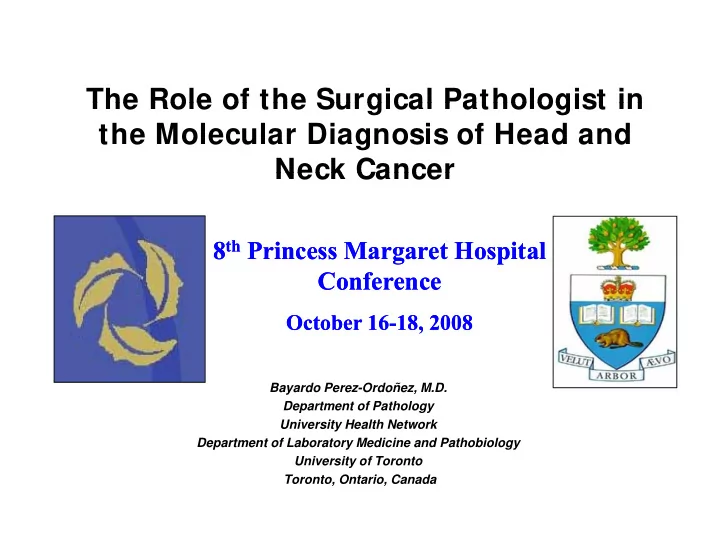

The Role of the Surgical Pathologist in The Role of the Surgical Pathologist in the Molecular Diagnosis of Head and Neck Cancer Neck Cancer th P i th Princess Margaret Hospital 8 th 8 th Princess Margaret Hospital P i M M H H i i l l Conference Conference October 16 October 16- -18, 2008 18, 2008 B Bayardo Perez-Ordoñez, M.D. d P O d ñ M D Department of Pathology University Health Network Department of Laboratory Medicine and Pathobiology University of Toronto Toronto, Ontario, Canada
Traditional Role of the Surgical Pathologist in Head and Neck Squamous Cell Carcinoma and Neck Squamous Cell Carcinoma � Diagnosis g � Evaluation of Prognostic Factors and Pathologic � Evaluation of Prognostic Factors and Pathologic Staging � Completeness of resection � Evaluation of presence/absence of metastases
Molecular Alterations in Head and Neck Squamous cell Carcinoma Carcinoma Normal mucosa Hyperplasia Dysplasia Carcinoma in-situ Squamous cell carcinoma 9p21 deletion 3p deletions 18q deletion 11q13 p16/p14 16/ 14 17 13 ( 53 17p13 (p53 10q23 13q21 inactivation mutations) 3q26 8p deletion Trisomy 7 Tetraploidy PTEN Aneuploidy EGFR EGFR i inactivation i i Cyclin D1 Telomerase amplification activation
Molecular Alterations Associated with metastasis in Squamous Cell Carcinoma Squamous Cell Carcinoma E-cadherin CXCR4-SDF1 VGEF(R)s, PDGF(R)s FGR(R)s, TGF α / β G ( )s, G α / β Interleukin-8 MMPs LOH: 6p 4q27 10q23 LOH: 6p, 4q27, 10q23
Squamous Cell Carcinoma, p53 and EGFR p53 EGFR
Nonkeratinizing Squamous Cell Carcinoma p16
Consensus primers MY09/11 Internal 423 bp Control 452 bp HPV Reagent Negative Patient HPV (+ ) 10(-3) HPV (+ ) 10(-4) HPV PCR 50 bp Ma arker 250 bp 400 bp 00 b 16F/R 96 bp HPV HPV 16 primers Reagent Negative Patient CaSki (+ ) 10 (-4) CaSki (+ ) 10 (-5) 50 bp Marker r 100 bp
HPV in-situ hybridization
β -globin High β globin Low β -globin Low Positive Control l Low Positive HPV-Linear Array Results Positive I nconclusive Negative Positive Negative Low Positive Reagent Contro ol
WHO Classification of Nasopharyngeal Carcinoma -Keratinizing squamous cell carcinoma -Nonkeratinizing carcinoma Differentiated type Undifferentiated type -Basaloid squamous cell carcinoma
Nonkeratinizing Carcinoma, Undifferentiated-type
EBV-DNA serum levels and monitoring of NPC g Patient 3 EBV copy number: Plasma chemotherapy 100000 100000 90000 89230.7 es/mL) 80000 70000 DNA (copie Abnormal Ab l 60000 PET/MRI 50000 XRT Normal PET/CNED 40000 EBV D 30000 20000 10000 0 0 182 9 182.9 0 52 0.52 26-Nov-01 21-Dec-01 7-Jan-02 65/F, T4N2, CRT, PET: normal, MRI: residual abnormality, CNED follow-up samples
Grade III Mucoepidermoid Carcinoma Grade II Grade I
CRTC1/ MAML2 fusion transcript and t(11;19) in Mucoepidermoid Carcinoma p http://atlasgeneticsoncology.org/Genes/Images/CRTC1
The prevalence of t(11;19) in mucoepidermoid carcinoma has ranged from 38-88% carcinoma has ranged from 38-88% . 38% 38% 88% 55%
CRTC1-MAML2 positive tumors appear to have a better prognosis than CRTC1-MAML2 negative tumors. Behboudi et al. Genes Chromosomes Cancer 2006;45:470-481 Okabe, M. et al. Clin Cancer Res 2006;12:3902-3907
Her2Neu FISH Salivary Duct Carcinoma Her2Neu
Recommend
More recommend